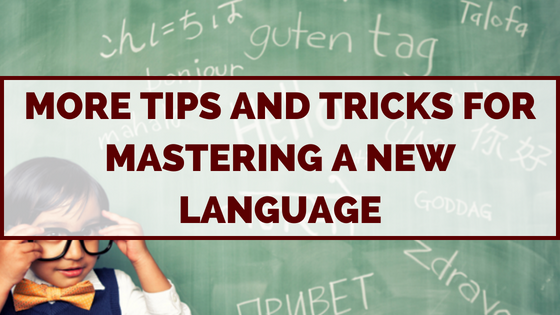More Tips and Tricks For Mastering A New Language
Takeaway Points:
Language learning isn't easy, but it can be done in a relatively short period of time if you're learning a language closely related to one you already speak, and if you're willing to put in a lot of solid effort.
I've been focusing on language learning in a more self-directed way recently, and wanted to share some more lessons I've learned about learning new languages.
Last year I started learning Danish as a part of our move to Denmark. Luckily, the Danish government provides for lessons for you to learn the language, making it easy for immigrants to start picking it up. Unfortunately, due to changes in my fiancee’s employment, we were forced to leave the country and move to the UK, just about a year after I had started learning.
During that time, I had passed my most recent exams, which certified a very basic speaking fluency in the language. However, I wanted to continue to practice and learn the language after we left, which created more problems since I no longer had access to the classes.
When I wrote up my first post about learning the language, I suggested a number of steps you can take to learn a new language, relatively quickly and easily, the way that I did. Here’s what a lot of those lessons boiled down to:
Adopt a growth mindset and accept that there will be difficulties and mistakes.
Put as much time into it, regularly, as you can.
Have some kind of accountability to keep you on track.
Use flashcards and reviewable word lists to strengthen vocabulary.
Since then, I’ve added some more tools to my toolset, primarily tools that work well because I don’t have the classes to serve as a primary learning point anymore:
News websites. By returning to the Danish news websites, I can regularly find good reading material, learn new vocabulary, and learn a bit about the current news to boot. In particular, DR’s Ligetil is designed to write the news in very simple Danish so that it can be easily understood - a great entry point.
eBooks. Thanks to the magic of the internet, it’s easier than ever to find books, including ebooks. By finding sites that sell ebooks in the target language, you can easily find reading material where, in the past, you would have had to search through specialty stores in your local area. If you can find ebooks compatible with the Kindle app, this is excellent because the Kindle app can automatically translate highlighted text, making it easy to double check the meaning of words you don’t know. Of course, it’s likely to be slow going as you have to double check words left and right, but it’s still vastly quicker than thumbing through a dictionary. I’ve combined this with the flashcard/wordlist strategy above to more easily get vocab to practice.
Television. I’ve gone through a lot of television to help maintain an ear for the language. Luckily, Netflix's recent push to get a lot of original programming means that they've picked up a lot of international shows in a variety of languages, a great starting point. Otherwise, you can look around on message boards for good ideas for shows in your target language.
Online Tutoring. Again, the magic of the internet has made it easier and easier to learn a new language. A relatively new phenomenon is language tutoring via skype - you pay a tutor an hourly rate to chat, learn, and practice the language. While this costs a bit more than other methods, it makes it much easier to interact with native speakers than simply searching for people to interact with in your area.
Apps. While apps aren't a great method for learning languages since they have a limited vocabulary and lack much focus on conversation/spoken language, they're easily accessible and can allow you to start learning the basics of a new language right away.
Going has definitely been slower due to the lack of accountability that I used to have with regular, local classes for hours each week. However, I have usually focused on getting in at least some practice every day.
Again, language learning isn’t easy. But, with regular, focused practice, you can avoid wasting time on activities that aren’t useful and don’t help to expand your grasp of your language of choice.
For more on the topic of languages, I recommend my Better series (particularly Smarter and Wiser) for more about learning new intellectual skills. This is where I've distilled a lot of my best wisdom and guidelines for learning, after years of focusing on self-improvement and intellectual curiosity. I promise, you won't regret it.
Enjoy this post? Share the gains!
Ready to be your best self? Check out the Better book series, or download the sample chapters by signing up for our mailing list. Signing up for the mailing list also gets you two free exercise programs: GAINS, a well-rounded program for beginners, and Deadlift Every Day, an elite program for maximizing your strength with high frequency deadlifting.
Interested in coaching to maximize your results? Inquire here.
Some of the links in this post may be affiliate links. For more info, check out my affiliate disclosure.




